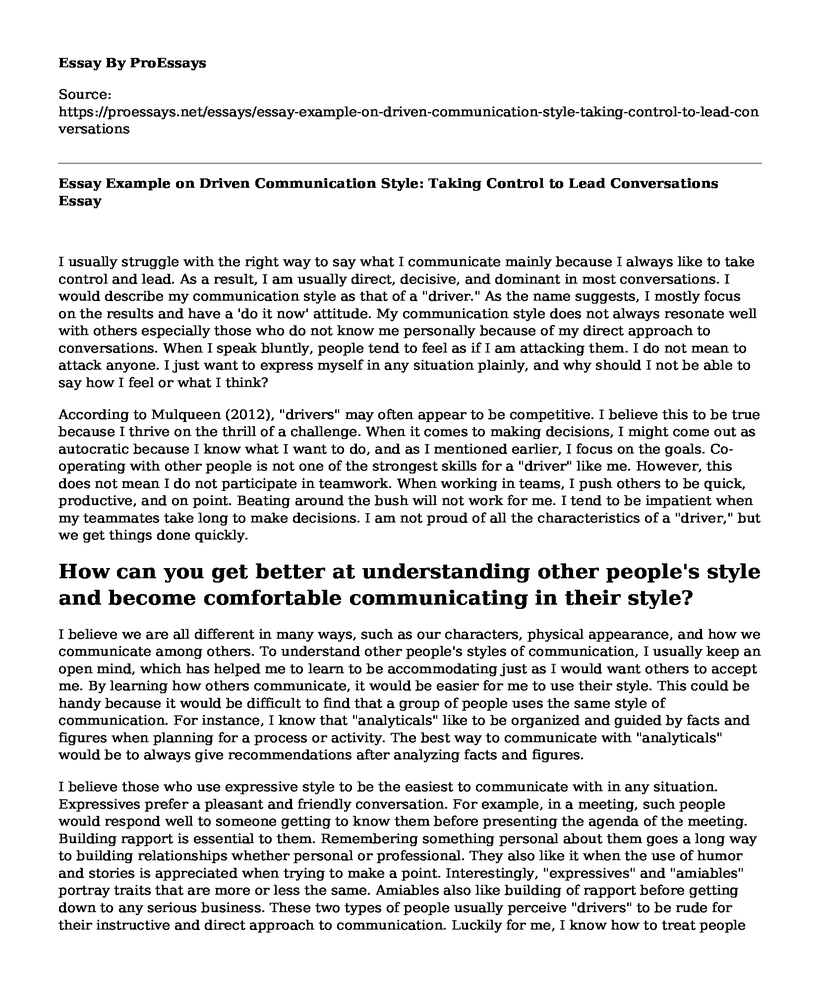I usually struggle with the right way to say what I communicate mainly because I always like to take control and lead. As a result, I am usually direct, decisive, and dominant in most conversations. I would describe my communication style as that of a "driver." As the name suggests, I mostly focus on the results and have a 'do it now' attitude. My communication style does not always resonate well with others especially those who do not know me personally because of my direct approach to conversations. When I speak bluntly, people tend to feel as if I am attacking them. I do not mean to attack anyone. I just want to express myself in any situation plainly, and why should I not be able to say how I feel or what I think?
According to Mulqueen (2012), "drivers" may often appear to be competitive. I believe this to be true because I thrive on the thrill of a challenge. When it comes to making decisions, I might come out as autocratic because I know what I want to do, and as I mentioned earlier, I focus on the goals. Co-operating with other people is not one of the strongest skills for a "driver" like me. However, this does not mean I do not participate in teamwork. When working in teams, I push others to be quick, productive, and on point. Beating around the bush will not work for me. I tend to be impatient when my teammates take long to make decisions. I am not proud of all the characteristics of a "driver," but we get things done quickly.
How can you get better at understanding other people's style and become comfortable communicating in their style?
I believe we are all different in many ways, such as our characters, physical appearance, and how we communicate among others. To understand other people's styles of communication, I usually keep an open mind, which has helped me to learn to be accommodating just as I would want others to accept me. By learning how others communicate, it would be easier for me to use their style. This could be handy because it would be difficult to find that a group of people uses the same style of communication. For instance, I know that "analyticals" like to be organized and guided by facts and figures when planning for a process or activity. The best way to communicate with "analyticals" would be to always give recommendations after analyzing facts and figures.
I believe those who use expressive style to be the easiest to communicate with in any situation. Expressives prefer a pleasant and friendly conversation. For example, in a meeting, such people would respond well to someone getting to know them before presenting the agenda of the meeting. Building rapport is essential to them. Remembering something personal about them goes a long way to building relationships whether personal or professional. They also like it when the use of humor and stories is appreciated when trying to make a point. Interestingly, "expressives" and "amiables" portray traits that are more or less the same. Amiables also like building of rapport before getting down to any serious business. These two types of people usually perceive "drivers" to be rude for their instructive and direct approach to communication. Luckily for me, I know how to treat people how I would like them to treat me. Hence, I can always be comfortable communicating with people using their style.
Reference
Mulqueen, C. (2012). Social Style.
Cite this page
Essay Example on Driven Communication Style: Taking Control to Lead Conversations. (2023, Apr 24). Retrieved from https://proessays.net/essays/essay-example-on-driven-communication-style-taking-control-to-lead-conversations
If you are the original author of this essay and no longer wish to have it published on the ProEssays website, please click below to request its removal:
- Fundamental Relationship Forms and Negotiation Paper Example
- Essay Sample on Ethical Issues in Shell Company
- Essay Sample on the Roles of Women
- Essay Example: Ethical Dilemmas of Euthanasia and Physician-Assisted Suicide
- Essay on Police Searches & Seizures: The Balance Between Civil Liberties & Society
- Reducing Expenses & Increasing Profits: Companies Adopt SCADA Operation for Business Networking - Paper Sample
- Research Paper Example: Inclusive Development in South Africa







